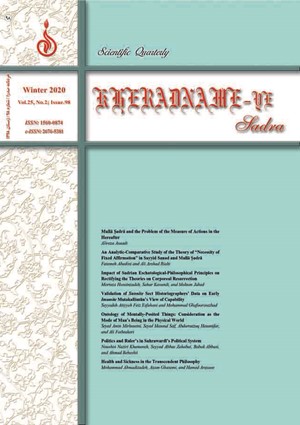Politics and Ruler’s in Suhrawardī’s Political System
Subject Areas :Nooshin Naziri khameneh 1 , Abbas Zahabi 2 , Baabak Abbasi 3 , Ahmad Beheshti 4
1 -
2 -
3 -
4 - University of Tehran
Keywords: Politics wayfaring ruler sage higher world spiritual leader (quṭb) self-knowledge Suhrawardī ,
Abstract :
Conduct is a keyword in Suhrawardī’s political system. In his view, conduct or wayfaring begins with self-knowledge at the individual level and moves them ahead to the social and political level and, finally, to ruling over a society. Suhrawardī’s intended ruler is a philosopher who, through self-knowledge, steps into higher worlds, including the world of Ideas, which is the first world higher than the world of bodies in Suhrawardī’s philosophy. Through wayfaring in this world, the philosopher turns into an intermediary between the world of human beings and the world of God and angels. Through self-knowledge, wayfaring in the world of Ideas, and obedience to God, the philosopher further reaches the level of the spiritual leader, Imām, and leadership of the world. By considering the ruler as the spiritual leader or Quṭb and as an individual who is capable of connecting with the world of Ideas and mediating between God and human beings, Suhrawardī investigates politics, governance, ideal governance, and utopia in the light of a new philosophy. His views in practical wisdom and, particularly, politics correspond to his views in theoretical wisdom concerning some principles such as gradation, nobler possibility, wrath and kindness, and gradedness of the world. For Suhrawardī, as the world of Ideas, which among his own innovations, mediates between the world of matter and the world of omnipotent lights, the philosopher-ruler is related to the world of Ideas and mediates between human beings and God and also angels. The ruling of a ruler with the characteristics intended by Suhrawardī is never idealistic, far-fetched, or limited to specific people; rather, it is quite real and possible. Such a ruler pays attention to people’s happiness not only in the material world but in the hereafter.
ابوريان، محمدعلي (1385) مباني فلسفه اشراق از ديدگاه سهروردي، ترجمة محمدعلي شيخ، تهران: دانشگاه شهيد بهشتي.
احمدي، حسن؛ حسيني خامنه، سيدمحمدرضا (1388) «جايگاه عالم مثال در فلسفه سهروردي»، خردنامه صدرا، ش56، ص85 ـ 69.
اسفنديار، رجبعلي (1380) «حاكم مطلوب در انديشة شيخ اشراق»، علوم سياسي، سال پنجم، ش17، ص142 ـ 131.
بستاني، احمد (1389) «حاكم آرماني و عالم خيال در حكمت سياسي اشراقي»، جاويدان خرد، دورة جديد، ش 4، ص26 ـ 5.
بستاني، احمد (1394) «سهروردي و اندرزنامهنويسي اشراقي»، سياست متعاليه، سال سوم، پاييز،ش 6، ص38 ـ21. بستاني، احمد (1388) «مباني وجودي آرمانگرايي سياسي در فلسفة اسلامي»، پژوهش سياست نظري، ش 7، ص26 ـ 1.
سهروردي (1380) مجموعه مصنفات شيخ اشراق، تصحيح و مقدمه هانري كربن و ديگران، تهران: پژوهشگاه علوم انساني و مطالعات فرهنگي.
شهرزوري، شمسالدين محمد (1380) شرح حكمة الاشراق، تصحيح و مقدمه حسين ضيائي تربتي، تهران: پژوهشگاه علوم انساني و مطالعات فرهنگي.
شيخ صدوق (1357) التوحيد، تصحيح سيدهاشم الحسيني الطهراني، قم: جامعة مدرسين حوزه علمية قم.
طاهري، سيدصدرالدين (1385) ترجمه و حاشيهنگاري المشارع و المطارحات سهروردي، تهران: مركز اسناد مجلس شوراي اسلامي.
ضيائي، حسين (1380) «مقدمه»، در: شهرزوري، شمسالدين محمد، شرح حكمةالاشراق، تهران: پژوهشگاه علوم انساني و مطالعات فرهنگي.
كربن، هانري (1369) فلسفة ايراني و فلسفة تطبيقي، ترجمة سيدجواد طباطبايي، تهران: طوس.
كربن، هانري (1373) تاريخ فلسفة اسلامي، ترجمة جواد طباطبايي، تهران: كوير.
كربن، هانري (1384) روابط حكمت اشراق و فلسفه ايران باستان، ترجمة ع. روحبخشان، تهران: اساطير.
كربن، هانري (1391) چشماندازهاي معنوي و فلسفي اسلام ايراني، تحقيق و ترجمۀ انشاءالله رحمتي، تهران: سوفيا.
كربن، هانري (1395) ارض ملكوت، مقدمه، ترجمه و تحقيق انشاءالله رحمتي، تهران: سوفيا.
كليني (بيتا) اصول كافي، ترجمه و شرح سيدجواد مصطفوي، تهران: علميه اسلاميه.
ملكي، محمد (1389) در امتداد وحي و عرفان، قم: اديان.
نصر، سيدحسين (1380) «مقدمه» در: سهروردي، مجموعه مصنفات، شيخاشراق، ج3، تهران: پژوهشگاه علوم انساني و مطالعات فرهنگي.
نوربخش، سيما (1383) نور در حكمت سهروردي، تهران: نشر شهيد سعيد محبي.
يزدانپناه، سيديدالله (1393) حكمت اشراق، قم: پژوهشگاه حوزه و دانشگاه.


